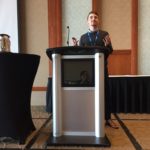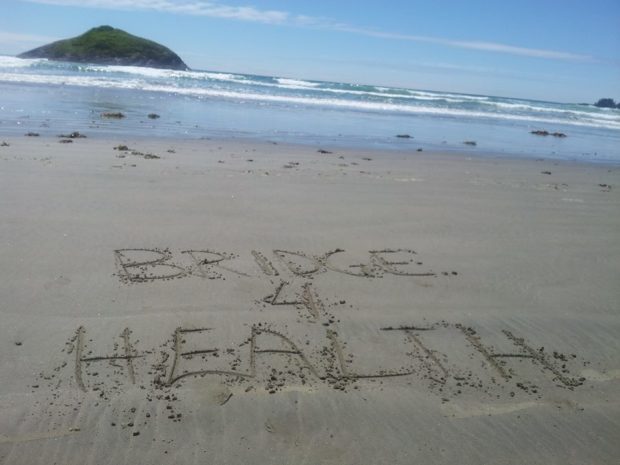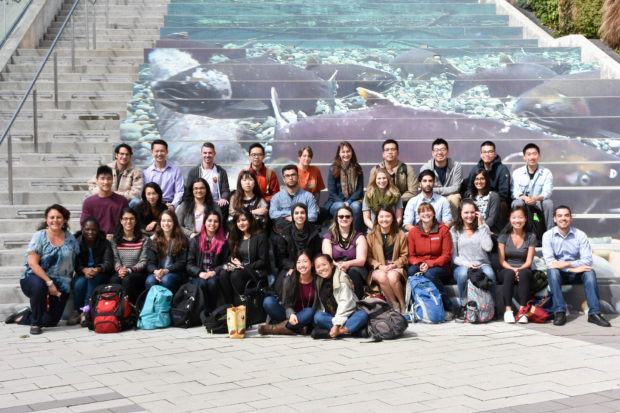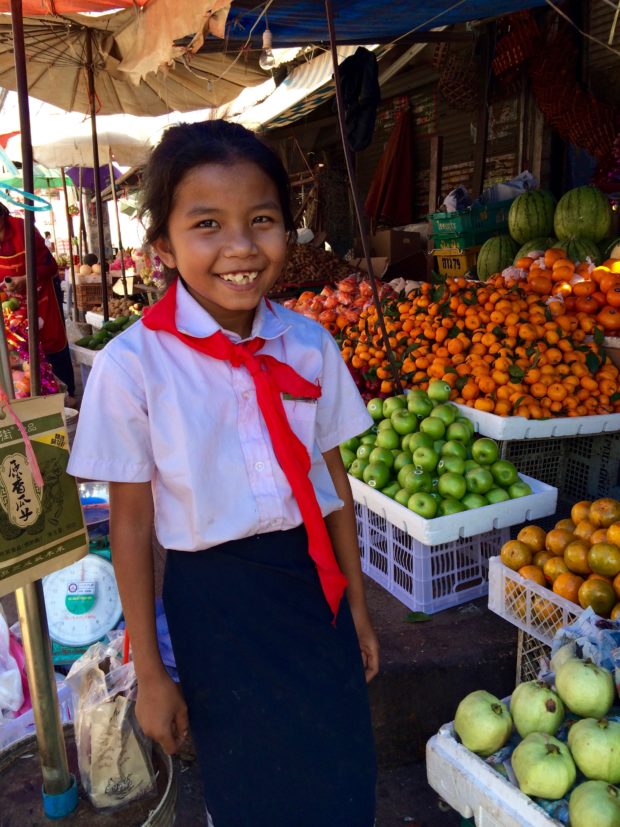On February 15th, 2017, Bridge for Health Coop receive SFU’s 2017 Coast Capital Savings Award for Social Impact!

On February 15th, 2017, Bridge for Health Coop receive SFU’s 2017 Coast Capital Savings Award for Social Impact!

“Think globally, act locally” was one of the enduring slogans of the 1970’s environmental movement. But I believe that we need to think locally as well as act locally, and thus I am leading the organisation of a series of local Conversations on Victoria as a One Planet region, a concept I first suggested in my August 10th column last year. The purpose is to explore the idea and begin the process of imagining a future for our community where we have a high quality of life and a low ecological footprint.
But this is no mere academic exercise, it has a very practical application. We are entering the Anthropocene, a new geologic epoch created by human activity. We have become a force to rival nature; in one telling line in a short video – Welcome to the Anthropocene – produced for a 2012 international conference in London, the narrator notes “we move more sediment and rock annually than all natural processes, such as erosion and rivers”.
On top of that, we are changing the climate, have made a hole in the ozone layer, manage three-quarters of the land outside the ice-sheets, and have started a sixth Great Extinction. Our rate of resource use and pollution is so high that if everyone on Earth lived the way we do, we would need three or four new planets to meet our demands.
We cannot blithely continue on like this. Nor can we say to the rest of the world – sorry, you must take less so that we can take more; it would be unjust and they will not accept that. So clearly we need to learn to live within the limits of the one small planet that is our home.
I recently came across Bioregional, a non-profit consultancy based in the UK. They have mainly been working with developers on ‘One Planet’ developments; Dockside Green, as orginally conceived, would have fitted right in. But more recently, some cities have been developing and adopting One Planet plans; of particular interest to us is Brighton and Hove, on the south coast of England, which has a population about the same as ours. And last Friday in Vancouver there was an event to begin to explore ‘How do we become a One Planet city?’ So our series of Conversations are right on target.
But getting from here to there will not be easy, because the changes we need are massive, transformative – and they have to happen quickly. However people are not going to willingly and easily make the changes that are needed if they see them as harmful. That is the dilemma – and the challenge – we face. Can we imagine and then describe a positive vision of what our region would look like if it had a high Happy Planet Index? And more to the point, what would our society be like, how would we reconceive our economy, what are the value shifts we would have to bring about?
Our Conversations, then, clearly need to be as much about philosophy, the humanities, the arts and the social sciences as technology and the natural sciences. We will need need visionaries, hope and imagination, innovation and new forms of entrepreneurship that make a profit while building natural, social and human capital.
These free Conversations start Monday, January 23rd from 5 – 7 PM at the Robert Bateman Centre, 470 Belleville Street and continue weekly for 5 weeks. The opening Conversation will lay out some basic ideas and discuss the estimation of Victoria’s ecological footprint, an essential step in measuring the HPI. Over the following weeks we will discuss the Indigenous perspective on these issues (Jan 30) and what a One Planet energy system (Feb 6), transportation system (Feb 13) and food system (Feb 22nd) would look like.
This will culminate in a UVic IdeaFest event on Saturday March 11th at New Horizons in James Bay. But already ideas are being hatched for more Conversations: What is the role of the arts in contributing to this transformation? What do the various faith communities have to say about a One Planet way of life? What sort of economy fits a one Planet region- and many more issues. The Conversation is just beginning.
© Trevor Hancock, 2017
Originally Published in Times Colonist.
Photo by Claudio Vasquez.
 Shannon Turner, B.A., BSc., MSc., PhD(c)., is a well-respected senior public health administrator, researcher and advocate. Her lifelong commitment to social justice is reflected in Shannon’s nearly continuous volunteer and advocacy efforts over the last twenty years. Shannon served as President, Past President and chair of governance committee of the Public Health Association of British Columbia (PHABC) and currents serves as the Executive Director of PHABC. Currently, Shannon is the National Co-Chair of Prevention of Violence Canada and an elected board member of the Canadian Public Health Association. Shannon is also committed member of the Global Violence Prevention Alliance, and has served on the Working Group for the Assets Database and participated in numerous VPA meetings and conferences.
Shannon Turner, B.A., BSc., MSc., PhD(c)., is a well-respected senior public health administrator, researcher and advocate. Her lifelong commitment to social justice is reflected in Shannon’s nearly continuous volunteer and advocacy efforts over the last twenty years. Shannon served as President, Past President and chair of governance committee of the Public Health Association of British Columbia (PHABC) and currents serves as the Executive Director of PHABC. Currently, Shannon is the National Co-Chair of Prevention of Violence Canada and an elected board member of the Canadian Public Health Association. Shannon is also committed member of the Global Violence Prevention Alliance, and has served on the Working Group for the Assets Database and participated in numerous VPA meetings and conferences.
Prior to undertaking full time Doctoral studies Shannon was Director of Public Health for the Vancouver Island Health Authority. In both her professional and personal life Shannon has been dedicated to the promotion of healthy communities, and social justice. For more than 25 years she has supported quality improvement activities across the health care continuum from local to international levels of governance. Shannon has provided decision support, health promotion, program management, information management, risk management, quality improvement and strategic planning consultant services. As a health promotion and health informatics consultant, Shannon has worked in multiple cross-cultural settings and has had a commitment to reducing health inequities particularly for indigenous people. Shannon served as a keynote in an international Speaking Tour in Sweden and Latvia in 1994 and 1996 and in 2008, she facilitated a thirteen country meeting in Uganda on behalf of the East, Central and South African Public Health Associations.
The University of Hawaii has named Shannon to the Delta Omega Society for outstanding contribution to public health. In 2008, she was awarded the James M. Robinson Award (UBC Public Health) for her significant contributions to public health. In 2009, she was presented with the President’s Award by the Public Health Association of BC for her work in rebuilding and renewing the association. Shannon Turner, has served as a foster parent, and is an honorary life member of the Vancouver Island Cooperative Preschool Association.
By Dr. Trevor Hancock
The high cost of health care, driven in part by a strategic failure to invest adequately in prevention and self-care support, is diverting our attention and resources from what should be our number one priority. On both humane and economic grounds we need to reduce the burden of disease and the need for health care.
But doing so is largely beyond the scope of the health care system and the Ministry of Health. Because the major determinants of our health lie in areas such as food, housing, education, income, safe and healthy neighbourhoods, good working conditions, a clean environment and a stable climate – none of which fall within the jurisdiction of the Ministry of Health. This requires reform for health, in which the whole government, led by the Premier, accepts and acts upon its responsibility to improve the population’s health.
As a society we need to invest in policies and practices that will improve the health of the population. And we have to stop creating ill health that just adds to the burden of disease and the costs of health care. Yet we know that “social injustice is killing people on a grand scale”, as the World Health Organization’s Commission on the Social Determinants of Health bluntly put it in its 2008 report; it is also making people sick on a grand scale.
People whose lives and choices are constrained by poverty, hunger, homelessness, poor education, unhealthy living and working conditions, multiple insecure jobs and other stressors will find it hard, if not impossible, to lead healthy lives and raise healthy children: It is a testament to their strength that so many manage to do so in the face of such adversity.
The costs of poverty and inequality are not only lost human potential but significant economic costs. In an April 2016 report, the Public Health Agency of Canada found that for just three health care services, representing only one quarter of total health care spending, “socio-economic health inequalities cost Canada’s health care system at least $6.2 billion annually”.
Noting that the lowest income group accounted for more than half of this excess cost, they concluded that “Improving the health of this group could significantly reduce these costs”. When you add in the other costs associated with poverty, it becomes clear that poverty is so expensive that we just cannot afford it. Which is why provinces such as Ontario are beginning to look at some form of guaranteed minimum income.
In addition, we are becoming increasingly aware that our current economic and industrial system is creating massive global ecological changes that threaten to undermine the very basis of our health: An adequate supply of water, food, fuel and materials, waste detoxification, a stable climate and a viable web of life, of which we are a part.

Photo
by
Claudio Vasquez.
The danger is that when ecosystems decline, the societies embedded within and dependent upon them also decline. In ecological and human health terms, business as usual is so expensive that we can’t afford it. We need to switch to a new development path, one that puts people and planet first, not profit – at least, not profit based in an economic system that ignores or externalises damage to people and the planet.
We need to invest in poverty reduction, affordable housing, food security, education, a fossil fuel-free economy, sustainable development and other key determinants of health. Because ultimately, the health of our population depends upon what we do beyond health care.
But this is not only about public policy, important though that is. It is also about what the private sector does and how it behaves. The reality is that many private sector activities threaten health; we have seen countless examples of industries and investors that are determined to go on making money and ignoring the harm they do.
We need to pay much more attention to what Dr. John Millar, a former Provincial Health Officer for BC, has called ‘the corporate determinants of health’. In fact, we need a new economic model –in which we aim to simultaneously increase natural, social, human and economic capital – and new ways of measuring progress.
Now that would be reform for health!
© Trevor Hancock, 2016
Originally published in Times Colonist on 26 Dec, 2016
 Bridge for Health is proud to announce that Marco Zenone, youth engagement lead had the opportunity to introduce video Engaging the Leaders of Tomorrow at the 6th Global Health Promotion Forum being held in Charlottetown, Prince Edward Island, Canada on October 16 and 17, 2016.
Bridge for Health is proud to announce that Marco Zenone, youth engagement lead had the opportunity to introduce video Engaging the Leaders of Tomorrow at the 6th Global Health Promotion Forum being held in Charlottetown, Prince Edward Island, Canada on October 16 and 17, 2016.
#involveyouth
#6GFHP
Paola Ardiles, an SFU lecturer in health sciences created Bridge for Health as a Vancouver-based volunteer network to promote citizen engagement in health. Enabling people to have more control over the conditions that impact their health is the impetus for turning the network into a social enterprise. The launch of B.C.’s new Bridge for Health Co-op takes place on Wednesday, Sept. 28 in Vancouver.
The goal of Bridge for Health is to work with community organizations and businesses to co-design healthy social and built environments that promote wellbeing. Bridge for Health Innovation Labs aim to get at the root cause of illness in order to reduce stress and burn-out, which is causing huge social and economic impacts in the workplace.
Since its inception three years ago Bridge for Health has reached people across Canada and abroad and is evolving into an incubator of social innovation in health, with empowerment and community engagement at its core. A number of SFU students are also involved.
The co-operative model resulted from Ardiles’ consultations with the health, business and NGO sectors, and she says it’s an example of using innovative business models “as a force for good health.” Co-ops promote inclusiveness, collective leadership and shared ownership, all concepts core to promoting health and wellbeing.
The new B.C. Co-op will focus on social innovation research and consulting. The launch party will include a talk with best-selling author, physician and SFU alumnus Dr. Gabor Maté.
What: Party for Bridge for Health’s co-operative launch
When: Wednesday, September 28 at 6:45-9 pm
Where: Centre for Peace, 1806 W 15th Avenue, Vancouver
Who: the general public is welcome
More information and purchase tickets here.
Who are we?
Bridge for Health was created in 2013 as a volunteer based network to foster innovative strategies that enable people to have more control over conditions that impact their health. Since its inception three years ago the network has reached people across Canada and abroad, and has evolved into an incubator of social innovation in health, with empowerment and community engagement at its core.
Our Goal
The co-op works with community organizations and businesses to co-design healthy social and built environments that promote wellbeing. The ultimate goal is to support transformation of our society towards a safe, sustainable and healthy future for all.
Why a co-op?
Co-ops promote inclusiveness, collective leadership and shared ownership, all concepts that are core to promoting health and wellbeing. The co-op will focus on social innovation research and consulting.

How to get involved?
Join the co-op member today!
Have a say in how we operate and grow.
Make an impact and join our research and consultant team or join one of our committees to help us sustain our efforts..
Connect today at info@bridgeforhealth.org
 By Marianne Meadahl, Paola Ardiles, Shawn Smith, Simon Fraser University
By Marianne Meadahl, Paola Ardiles, Shawn Smith, Simon Fraser University
The community will become the classroom for one group of Simon Fraser University students this fall. As part of their involvement in an immersive course called Health Change Lab, they’ll be tasked with finding potential solutions for some key community health issues, while learning from and being mentored by community stakeholders.
Billed as a “living laboratory” the Surrey-based course was developed by Paola Ardiles from SFU’s Faculty of Health Sciences and Shawn Smith from the Beedie School of Business RADIUS social innovation lab. Working together with the City of Surrey and Fraser Health, students will spend one day a week in Surrey, conceiving ideas and creating projects designed to impact health and wellbeing in the community.
The Change Lab concept was launched five years ago by SFU alumna Jennifer McRae while still an undergraduate student, as an experiment in the future of learning at universities. Run for several years as an interdisciplinary experience between the Faculty of Environment and Beedie School of Business, the program has been offered at all three campuses and is now partnering with Health Sciences and adding a Health Change Lab cohort in Surrey. Students in any of the Change Labs earn seven credits towards a certificate in Entrepreneurship and Innovation.
In Surrey, health innovation dovetails with SFU’s relationship with neighboring Fraser Health Authority, the City of Surrey and the University’s role as a co-founder of the burgeoning Innovation Boulevard, designed to grow health and health technology in the region.
“This is a unique approach because students are not only learning, they will be making a difference in this community, as they will work on priority issues identified by Surrey partners,” says Paola Ardiles, a lecturer in health sciences and champion of health innovation, based at the Surrey campus.
The 30-student cohort includes students from health sciences, business, interactive arts and technology, and arts and social sciences. Students will spend the first week getting to know an array of community players and take a “social innovation walking tour” of downtown Surrey. A retreat to shore up their roles as prospective change-makers will follow.
They’ll next identify key issues such as food security and active transportation, taking a wide view that focuses on root causes rather than symptoms.
Students will share their emerging venture concepts with a panel of entrepreneurs and community leaders for feedback, drawing input from mentors. They’ll do a “deep dive” into prototyping and test their early stage ideas, giving demos and making presentations along the way.
“Our goal with the Change Labs concept is to create the most powerful experience of each participant’s undergraduate experience,” says Shawn Smith founder of RADIUS. The Health Change Lab, like other courses in the entrepreneurship and innovation program, focuses on building great future entrepreneurs, moreso than specific venture outcomes. But Smith says many Change Lab concepts have already moved on to the incubation process. “Our plan,” he adds, “is to be SFU’s main pipeline of future change-makers.”
You can follow the student’s journey this term via #healthchangelab
Bridge for Health Coop Launch Event!
We are happy to announce that we will be hosting the launch of our new Coop Association in Vancouver on Wednesday September 28th, 2016! We have a very special evening lined up including a talk with renowned author and best seller Dr. Gabor Maté! Tickets are going fast and seats are limited so make sure you purchase your ticket today!
The concept of resilience has received a lot of attention in recent years, perhaps because we face increasing challenges at all levels, from the personal to the global. Resilience is seen as an important way of responding to those challenges, or having the capacity to respond.
The word stems from the Latin resilire, meaning to jump back or recoil. It seems to have first been used in engineering, but then has been taken up by disciplines as diverse as ecology, child psychology, community and social development and urban planning; the British Standards Association even has a Standard for organizational resilience.
In psychology, the term refers to “the process of adapting well in the face of adversity, trauma, tragedy, threats, or even significant sources of stress”, according to the American Psychological Association. Importantly, they and others are clear that resilience is not something you are born with, but that it is to a large extent a learned behavior and an attitude – and once learned, it stays with you for life.
Research has provided us with a good idea of what promotes resilience in people, especially young people: having caring and supportive relationships within and outside the family. If children feel loved and have people around them they can trust, they are likely to be able to handle challenges and succeed in managing them.
As Sherri Torjman of the Caledon Institute noted in her 2007 book Shared Space: The Communities Agenda, building resilience requires communities to invest in both personal capacity development – “the skills, abilities and assets of individuals and households” – and community infrastructure – “the supply of amenities and resources that contribute to wellbeing”. In fact, there is a reciprocal and mutually reinforcing relationship between resilient people and resilient communities.

Photography by Claudio Vasquez
In more recent times, the concept of resilience has been applied to social as well as natural systems; communities, organisations, even societies and nations. A recent book from the Canadian Institute for Advanced Research describes it as the ability of these social systems to “to sustain and advance their wellbeing in the face of challenges to it”. Indeed the lead authors consider social resilience to be “a key characteristic of successful societies” – and, we might add, communities.
Resilience in ecosystems has a somewhat different meaning than it does in psychology. In 1973 C. S. Hollings not only defined ecological resilience but importantly, he showed that one way that natural systems handle changes and disturbance is that they can flip into a new and different stable state.
This is an important shift in our thinking about resilience, because we don’t necessarily want to ‘bounce back’ if that means we return to the situation that was the problem – or caused the problem – in the first place. Instead, we need to ‘bounce forward’, out of the situation that is causing the stresses and into a new, better alternative stable state.
Which brings us to the topic of healthy cities, where many of these concepts come together. Because healthy cities consist of people, both as individuals and gathered in communities, as well as a multitude of public, private and non-profit organisations, all embedded within natural systems. If cities – or more precisely, the people in cities – are to remain healthy in these challenging times they not only need to be resilient themselves, they need their communities, organisations and ecosystems to also be resilient.
Because ultimately, we are only as resilient and healthy as the natural ecosystems in which we are embedded. So we have to stop – and in fact reverse – the stresses we are placing on these systems, which means shifting to an ecologically sustainable way of life.
We may not be able to make natural systems more resilient, but we must avoid stressing them up to and beyond their tipping points; we don’t want to push them to the point where they shift into a new stable state that may not be compatible with human civilization.
As we face the many challenges of the 21st century, whether as individuals, communities, cities or entire societies, we need to bounce forward to a healthier, more just, more sustainable future, not back to the 20th century conditions and way of life that have created the problems we face.
© Trevor Hancock, 2016
Originally published in Times Colonist, 17 Aug, 2016.